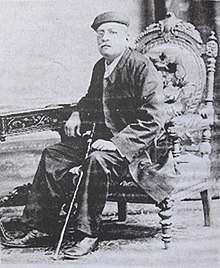Ichharam Desai
Ichharam Suryaram Desai (10 August 1853 – 5 December 1912), also known by his pen name, Shankar, was a Gujarati author, anthologist and journalist. Though he did not complete his primary education, he worked with several newspapers and magazines and also wrote several novels, edited anthologies and translated classics.
Ichchharam Suryaram Desai | |
|---|---|
 | |
| Born | 10 August 1853 Surat, British India |
| Died | 5 December 1912 (aged 59) |
| Pen name | Shankar |
| Occupation | Author, anthologist and journalist |
| Signature | |
Life
Ichharam was born on 10 August 1853 in Surat. He studied through sixth grade in English and during his youth developed an interest for manuscripts. He briefly worked for Deshimitra press as a typesetter. He moved to Bombay in 1876. He published Aryamitra weekly for four months before joining Bombay Samachar as a proofreader. In 1878, he moved back to Surat and started a monthly publication, Swatantrata, named by poet Narmad.[1][2][3]
He was arrested for treason by British for its political writing but was freed later with the help of Pherozeshah Mehta.[1] He again went to Bombay in 1880 and started publishing the Gujarati weekly which he ran until his death on 5 December 1912.[2][3][4][5][6][7]
Works
Hind ane Britannia (1886) is a political novel which discuss political conditions under British Raj in India of that time. His Shivajini Loot (1888) and Tipu Sultan (part 1, 1889, incomplete) are his historical novels. Ganga — Ek Gurjarvarta (1888) and Savitasundari (1890) are his social novels. Rajbhakti Vidamban (1889) and Bharatkhand na Rajyakarta are his other works.[2][3][8][9]
Chandrakant (1889, 1901, 1907) is an incomplete series on Vedanta philosophy. He compiled the Brihat Kavyadohan, volume I—VIII (1886—1913), an anthology on medieval Gujarati poets and poetry.[3][10] He edited several books including Purushottam Maas ni Katha (1872), Okhaharan (1885), Nalakhyan (1885), Padbandh Bhagwat (1889), Krishnacharitra (1895), Adi Bhaktakavi Narsinh Mehta Krit Kavya-sangraha (1913). He edited translation of Mahabharata in three volumes (1904, 1911, 1921) after being translated by others.[2][3][11]
He translated several works into Gujarati including Raselas (1886), Yamasmriti (1887), Maharani Victoria nu Jivancharitra (1887), Charucharya athva Subhachar (1889), Arabian Nights volume 1–2 (1889), Kathasaritsagara volume 1–2 (1891), Kalavilas (1889), Vidurneeti (1890), Kamandkiya Neetisaar (1890), Saral Kadambari (1890), Shridhari Geeta (1890), Shukneeti (1893), Balako no Anand volume 1–2 (1895), Rajatarangini athva Kashmir no Itihaas volume 1 (1898), Aurangzeb (1898), Panchadasi (1900), Valmiki Ramayana (1919).[2][3]
References
| Wikisource has original text related to this article: |
- Ravi Kalia (January 2004). Gandhinagar: Building National Identity in Postcolonial India. University of South Carolina Press. p. 22. ISBN 978-1-57003-544-9.
- "ઈચ્છારામ દેસાઈ". Gujarati Sahitya Parishad (in Gujarati). Retrieved 21 September 2014.
- Amaresh Datta (1987). Encyclopaedia of Indian Literature: A-Devo. 1. Sahitya Akademi. pp. 923–924. ISBN 978-81-260-1803-1.
- Shirin Mehta (1 December 1984). The peasantry and nationalism: a study of the Bardoli satyagraha. Manohar. p. 63.
- Sujata Patel (26 October 1995). Bombay: mosaic of modern culture. Oxford University Press. p. 93. ISBN 978-0-19-563689-5.
- Makrand Mehta (1990). Regional roots of Indian nationalism: Gujarat, Maharashtra, and Rajasthan. Criterion Publications. pp. 19–25.
- Smt. Hiralaxmi Navanitbhai Shah Dhanya Gurjari Kendra (2007). Gujarat. Gujarat Vishvakosh Trust. pp. 57, 504.
- V. K. Chavda (1982). Modern Gujarat. New Order Book Company. pp. 71, 164.
- Prabhākara Mācave (1979). Literary Studies and Sketches. United Writers : selling agents, Firma KLM. p. 102.
- Behramji Malabari (1882). Gujarat and the Gujaratis: Pictures of Men and Manners Taken from Life. Asian Educational Services. p. 165. ISBN 978-81-206-0651-7.
- Krishnalal Mohanlal Jhaveri (1934). The Present State of Gujarati Literature. University of Bombay. p. 69.
External links
- Ichharam Desai on GujLit